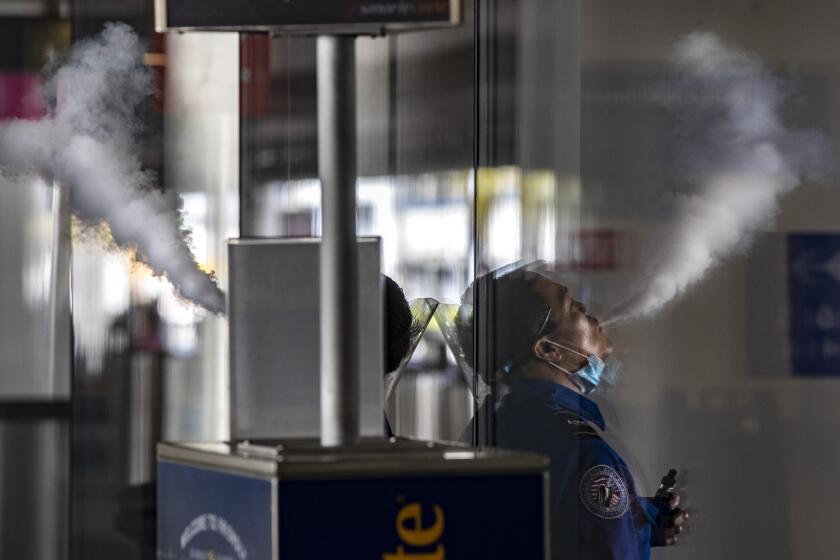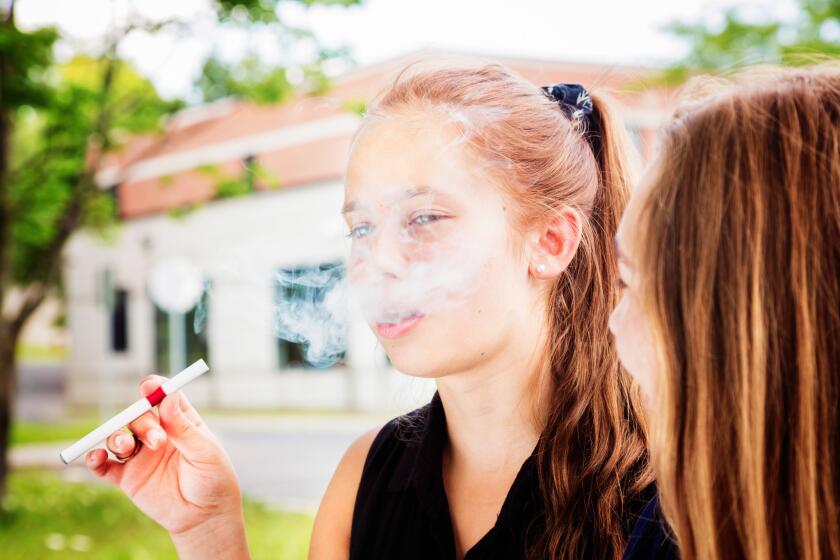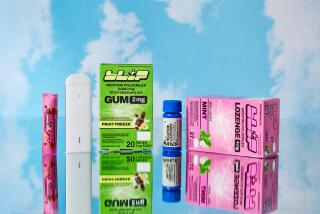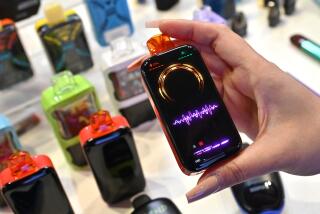In a first, FDA authorizes an e-cigarette, citing benefit for smokers
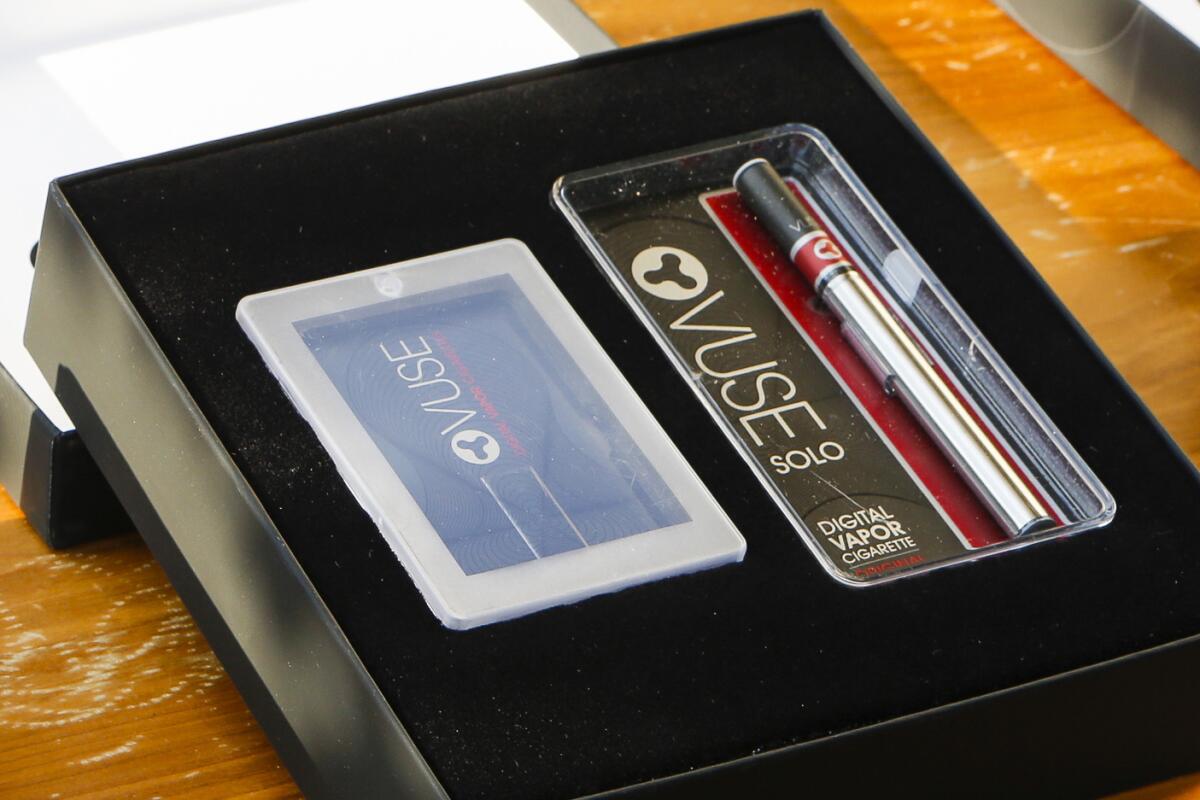
WASHINGTON — For the first time, the Food and Drug Administration on Tuesday authorized an electronic cigarette, saying R.J. Reynolds’ Vuse vaping device can help smokers cut back on conventional cigarettes.
E-cigarettes have been sold in the U.S. for more than a decade, with minimal government oversight or research. Facing a court deadline, the FDA has been conducting a sweeping review of vaping products to determine which should be allowed to remain on the market.
In September, the agency said it had rejected applications for more than 1 million e-cigarettes and related products, mainly because of their potential appeal to underage users. But regulators delayed making decisions on most of the major vaping companies, including market leader Juul.
Tuesday’s decision applies to Vuse’s Solo e-cigarette and its tobacco-flavored nicotine cartridges. The agency said data from the company showed that the product helped smokers significantly reduce their exposure to the harmful chemicals in traditional cigarettes.
While the products can now be legally sold in the U.S., the agency stressed that they are neither safe nor “FDA-approved” and that people who don’t smoke shouldn’t use them.
Launched in 2013, Vuse Solo is a rechargeable metallic device that is shaped like a traditional cigarette. The FDA said it rejected 10 requests from the company for other flavored products. The agency is still reviewing the company’s request to sell a menthol-flavored nicotine formula.
The aim of the legislation is to discourage vaping by minors and bring taxes on e-cigarettes more in line with levies on other tobacco products, according to state Sen. Anna Caballero (D-Salinas), who authored SB 395.
“Today’s authorizations are an important step toward ensuring all new tobacco products undergo the FDA’s robust, scientific, premarket evaluation,” said Mitch Zeller, director of the FDA’s tobacco center, in a statement.
“The manufacturer’s data demonstrates its tobacco-flavored products could benefit addicted adult smokers who switch to these products — either completely or with a significant reduction in cigarette consumption.”
E-cigarettes appeared in the U.S. around 2007, with the promise of providing smokers with a less harmful alternative to traditional tobacco cigarettes. The devices heat a nicotine solution into a vapor that’s inhaled.
But there has been little rigorous study of whether e-cigarettes truly help smokers quit. And efforts by the FDA to begin vetting vaping products and their claims were repeatedly slowed by industry lobbying and competing political interests.
In recent years, the vaping market grew to include hundreds of companies selling an array of devices and nicotine solutions in various flavors and strengths. But the vast majority of the market is controlled by a few companies, including Juul Labs Inc., which is partially owned by Altria Group Inc., and Vuse.
The FDA tried to ban flavors years before the vaping outbreak. Top Obama officials rejected the plan
In just 46 days, over 100 tobacco advocates helped nix the ban on flavored e-cigarettes that might have prevented addiction in teens. Here’s how.
Vuse is the No. 2 vaping brand in the U.S., behind Juul, accounting for about a third of all retail sales. Parent R.J. Reynolds also sells Newport, Camel and other leading cigarettes.
A company spokesperson said in a statement that the FDA decision confirms “that Vuse Solo products are appropriate for the protection of the public health, underscoring years of scientific study and research.”
The company said it is still awaiting an FDA decision on its more popular vaping device, Vuse Alto.
To stay on the market, companies must show that their products benefit public health. In practice, that means proving that adults who use the products are likely to quit or reduce their smoking, while teens are unlikely to get hooked on them.
Kenneth Warner, a tobacco expert at the University of Michigan’s school of public health, said the news was a positive step for reducing the harms of smoking. But he lamented that only a vaping device backed by a big tobacco company was able to win the FDA’s authorization.
“The demands the FDA places on companies filing these applications are so extraordinarily difficult to meet that only those with huge resources and personnel — in terms of scientists, lawyers, researchers — are able to file successfully,” said Warner.
He said smaller companies and vape shops should have a separate path to get their products authorized by regulators.
The FDA declared underage vaping an “epidemic” in 2018 and has taken a series of measures aimed at the cartridge-based devices that sparked the problem, including limiting flavors to tobacco and menthol. Separately, Congress raised the purchase age for all tobacco and vaping products to 21.
Survey data collected this year showed that Vuse was the second most popular e-cigarette among high schoolers who vape, preferred by 10%. Juul was fourth, used by less than 6%.
FDA said it was aware of the data on Vuse’s popularity but decided to authorize its tobacco flavor “because these products are less appealing to youth and authorizing these products may be beneficial” for adult smokers.
The most popular brand among teens was a disposable e-cigarette called Puff Bar that comes in flavors such as pink lemonade, strawberry and mango. Disposable e-cigarettes are not subject to the same restrictions on flavors as products such as Juul.
Overall, the survey showed a drop of nearly 40% in the teen vaping rate as many kids stayed home from school during the pandemic. Still, federal officials cautioned against interpreting the results because they were collected online, instead of in classrooms.
More to Read
Sign up for Essential California
The most important California stories and recommendations in your inbox every morning.
You may occasionally receive promotional content from the Los Angeles Times.
